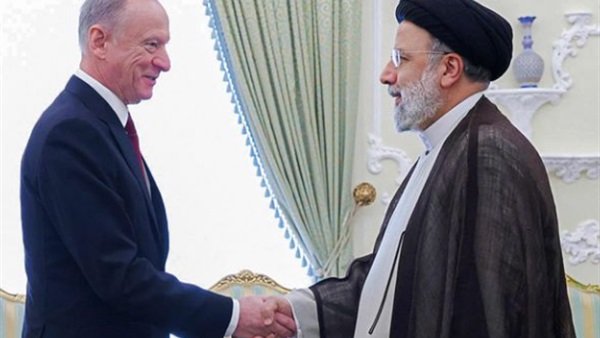Russia, Iran Pledge to Deepen Ties Amid Ukraine War

Russia and Iran’s security chiefs
pledged Wednesday to deepen the military cooperation between the two countries,
further cementing ties that have seen Tehran supply drones to bolster Moscow’s
war effort in Ukraine.
During a meeting in Tehran, Russian
security council secretary Nikolai Patrushev and his Iranian counterpart Ali
Shamkhani said they would jointly fight what they called Western interference
in their countries, and expand economic ties in a mutual effort to evade
sanctions.
“Expansion of bilateral and regional
cooperation, especially with the neighboring countries in the field of economy,
is part of our country’s strategic priorities,” Mr. Shamkhani said, according
to Iranian state television.
Mr. Shamkhani and Mr. Patrushev, who
also met Iranian President Ebrahim Raisi, discussed “ways to combat attempts by
Western intelligence agencies to interfere in the domestic affairs of the two
countries,” a statement in the Russian state news agency TASS said.
Iran has accused Western countries,
particularly the U.S., of orchestrating a protest movement that for weeks has
called for the ouster of the Islamic Republic. The White House in October said
Moscow may be advising Tehran on how to suppress the protests, “drawing on
Russia’s extensive experience in suppressing open demonstrations.”
The relationship between Iran and
Russia is evolving from a mostly transactional, military partnership to a more
ideologically rooted anti-Western alliance, a development experts say is driven
by Moscow’s international isolation following its invasion of Ukraine and the
diplomatic breakdown between Iran and the West as talks to revive the 2015
nuclear deal have stalled.
“Iran has grown in stature in the
eyes of Russians,” said Nicole Grajewski, a postdoctoral fellow with expertise
in Russian-Iranian relations at the Harvard Kennedy School’s Belfer Center.
“Russia and Iran have similar aspirational world views. They want a transition
of power away from the West.”
In Tehran, Mr. Patrushev repeated a
common refrain from Moscow that the days of U.S. dominance are drawing to a
close.
“The world is going through a
turning point,” Mr. Patrushev said, according to Russian state daily
Rossiyskaya Gazeta. “Russia and Iran today are at the forefront of the struggle
for the establishment of a multipolar world order.”
Mr. Patrushev’s comments echoed
long-held views by Iranian Supreme Leader Ali Khamenei, who last week said the
world was entering a new order, in which Asia would rise and the U.S. would
decline under domestic problems and failure in foreign wars.
Iran and Syria forged a military
cooperation in Syria where Tehran supported President Bashar al-Assad from the
early days of the war. Moscow joined the fray in 2015 and helped turn the war
in Mr. Assad’s favor.
As it did in the Middle East to
support allies, Iran is deploying home-grown weapons and a number of
Revolutionary Guard advisers to aid Russia in Ukraine.
In recent weeks, Russia has launched
more than 300 Iranian drones targeting military units, power plants and
civilian buildings in Kyiv, Ukrainian officials say. The U.S. says Tehran has
deployed personnel to Crimea to train Russian pilots to use Iranian-made drones.
Iran acknowledged publicly Saturday
for the first time that it has supplied drones to Russia, but said the transfer
took place before Moscow invaded Ukraine. U.S. officials dispute the claim.
Last month, Kremlin spokesman Dmitry
Peskov said the Russian army used only domestically produced equipment.
The European Union last month agreed
to impose sanctions on three top Iranian military officials and an Iranian
drone-maker, as the bloc concluded that Iran’s denials about supporting
Russia’s war were untrue.
Iranian drones have changed the
character of Russia’s air war and given Moscow a cheap way to bombard Ukrainian
infrastructure, such as the electricity grid, in a more sustained and intensive
manner when paired with its own arsenal of higher-end cruise and ballistic
missiles, said Justin Bronk, senior research fellow with expertise in air power
and military technology at the Royal United Services Institute think tank in
London.
“They create new and urgent air defense
requirements,” Mr. Bronk said. “They are not some kind of wonder weapon. But
because [the Russians] are firing so many, they are depleting Ukraine’s air
defenses, which need to be urgently resupplied.”
Moscow and Tehran are also seeking
to build a trade and economic alliance that can help them both resist American
financial pressure.
Iranian Oil Minister Javad Owji last
week said that sanctions on the two countries had created economic
opportunities, which he hoped would soon involve banking, payment channels and
Russian investment in Iran’s oil industry. Iran last month announced it would
supply 40 turbines to help Russia’s sanctions-hit gas sector.
At the end of 2021, trade between
the two nations increased by 81% to a maximum of $4 billion, of which Russian
exports made up more than $3 billion, according to the Russian state news
agency RIA Novosti.







